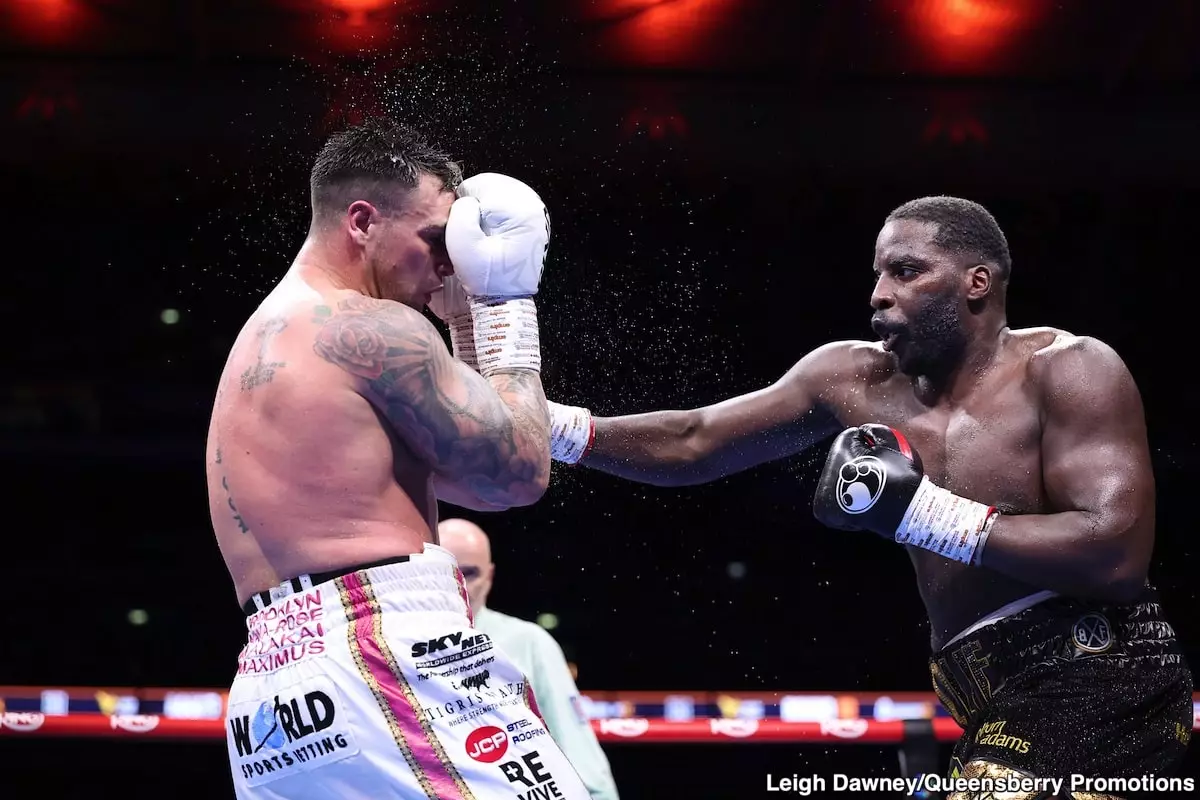In recent years, the heavyweight division has become a battleground of uncertainty and potential upheaval. The current champions, once unified and dominant, now face the prospect of division and fragmentation, catalyzed by strategic retirements, sanctioning body politics, and the relentless drive of contenders eager to seize opportunities. Among these hopefuls, Lawrence Okolie, a former cruiserweight champion turned burgeoning heavyweight contender, embodies a new wave of fighters poised to capitalize on this shifting landscape. His confident foresight into the division’s future reflects not just hope but a calculated understanding of the game’s evolving dynamics.
Okolie’s prediction that the current unified champion, Oleksandr Usyk, will relinquish his belts this year suggests an upcoming chaos — a chance for fresh titles to emerge. This insight isn’t just speculation; it’s rooted in the reality of Usyk’s own statements about nearing the end of his career and his intentions for a limited number of fights before contemplating retirement. If Okolie’s assessment proves correct, it could open doors for a new generation of heavyweights to ascend the ranks and claim their rightful place atop the division.
The Strategic Positioning of a Rising Contender
What makes Okolie’s outlook particularly compelling is his current standing within the division. As the No.1 WBC heavyweight contender, he positions himself as a prime beneficiary of the potential chaos. His two-fight record as a heavyweight may be modest, but his ambitions are clear and bold: to stake his claim for one of the vacant world titles. His target is not vague; it’s the WBC belt, especially with the interim champion German Kabayel in his sights.
Kabayel’s reputation as a devastating body puncher and an undefeated fighter provides a challenging but enticing matchup. If Usyk decides to vacate the belts, Kabayel would automatically elevate to full champion status, and Okolie’s mandatory shot would become a tangible reality. His confidence in this scenario reveals a fighter aware of the opportunities that regulation and timing can give him. It’s a masterclass in strategic patience and readiness; he recognizes that the division’s chaos is an opportunity, not a threat.
Yet, it’s also essential to question whether Okolie’s optimism is purely tactical or genuinely well-founded. Heavyweights like Kabayel aren’t just obstacles—they are potential stepping stones. His emphasis on the necessity of beating top fighters to win titles reflects a mature understanding that only the best deserve their crowns. His self-belief, combined with a calculated approach, signals a fighter who understands that victory in heavyweight isn’t just about knocking out opponents but about consistently beating elite competition.
The Significance of Domestic Matchups and Future Talk
In the realm of heavyweight boxing, national pride often influences matchups. Okolie’s interest in facing fellow Brit Fabio Wardley illustrates this point. The prospect of a domestic showdown resonates strongly with fans and fighters alike, adding a layer of intrigue and motivation. His description of Wardley as explosive and highly ranked suggests Okolie appreciates the challenge of fighting someone with a proven power edge, especially in the context of British boxing’s rich competitive history.
Furthermore, Okolie’s openness to fighting Daniel Dubois, another high-profile British contender, underscores his recognition of the value in domestic rivalries. These fights aren’t merely about titles; they’re about legacy, national pride, and asserting dominance within the UK scene. The fact that Okolie sees a potential fight with Dubois down the line indicates his long-term strategic planning and belief in his eventual ability to navigate through the division’s toughest opponents.
However, the division remains fluid, with Usyk’s next move casting a long shadow over everyone’s plans. The heavyweight division now resembles a chessboard, with each move—retirement, mandatories, unification—potentially altering the entire game. Okolie’s confidence is admirable, but whether he can capitalize on this tumultuous environment will depend on timing, preparation, and perhaps a little luck.
As heavyweight boxing braces for a period of fragmentation and renewal, fighters like Lawrence Okolie position themselves as both opportunists and contenders determined to shape the future. Whether he ultimately reaches the pinnacle depends not just on his skills but on his ability to navigate the division’s shifting allegiances and unpredictable developments. The next few months may very well define this new chapter in heavyweight history, and in this context, Okolie’s bold predictions and strategic mindset make him a fighter worth watching. The division’s destiny is being written now, with each contender aware that theirs might be the story that finally redefines heavyweight boxing for a new generation.

